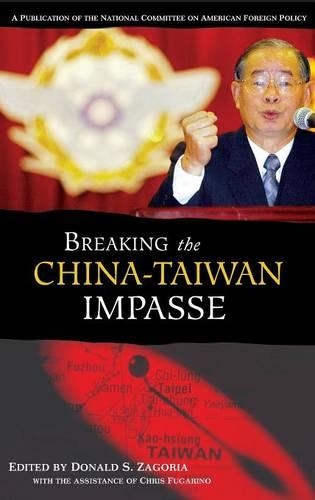
Breaking the China-Taiwan Impasse
(Hardback)
Available Formats
Publishing Details
Breaking the China-Taiwan Impasse
By (Author) Donald S. Zagoria
Bloomsbury Publishing PLC
Praeger Publishers Inc
30th October 2003
United States
Classifications
General
Non Fiction
Comparative law
327.5105124909049
Physical Properties
Hardback
288
Description
Tensions between China and Taiwan are not likely to abate in the foreseeable future. The question of Taiwan's sovereignty is the major point of friction, and the continuing impasse between China and Taiwan is worrisome. Zagoria presents perspectives from Washington, Beijing, and Taipei on cross-strait tensions, exploring ways to break the current standoff. Tensions between China and Taiwan are not likely to abate in the foreseeable future. The question of Taiwan's sovereignty is the major point of friction, and the continuing impasse between China and Taiwan is worrisome. Should critical political negotiations falter, relations are likely to take on stronger military overtones, and the PRC may well develop a sense of urgency about Taiwan drifting towards independence. These, at least, are the broad conclusions drawn from the ongoing dialogues among top U.S., Chinese, and Taiwanese figures, sponsored by the National Committee on American Foreign Policy. This Track II project provides a forum for top policy analysts from each country to discuss trilateral relations in a frank and constructive manner, and is an effort to explore means of peacefully resolving the current impasse. Among the more significant findings is that the more serious risks of conflict will probably occur in the distant future, hinging on whether economic integration can gradually lead to a reduction of political tensions, and that the United States should continue to oppose any declaration of independence by Taiwan and any use of force by China.
Reviews
[R]epresents an original and persistent effort to tackle one of the thorny issues in East Asian regional security....China watchers welcome this volume and eagerly await its sequel to learn more about cross-strait relations and the emergence of a feasible and peaceful policy to resolve the dispute.-Journal of Third World Studies
Breaking the China-Taiwan Impasse serves as a useful introduction to understanding the Taiwan issue not only for scholars but also for government officials and journalists. The book also may be used as a text for graduate or upper-division undergraduate courses on Asia.-Perspectives on Political Science
This book, the contributions of American, Taiwanese, and Chinese foreign-policy experts to a series of roundtables sponsored by the National Committee on American Foreign Policy, provides broad perspectives and substantive details on the difficult triangular relationship.-Foreign Affairs
"Represents an original and persistent effort to tackle one of the thorny issues in East Asian regional security....China watchers welcome this volume and eagerly await its sequel to learn more about cross-strait relations and the emergence of a feasible and peaceful policy to resolve the dispute."-Journal of Third World Studies
"[R]epresents an original and persistent effort to tackle one of the thorny issues in East Asian regional security....China watchers welcome this volume and eagerly await its sequel to learn more about cross-strait relations and the emergence of a feasible and peaceful policy to resolve the dispute."-Journal of Third World Studies
"This book, the contributions of American, Taiwanese, and Chinese foreign-policy experts to a series of roundtables sponsored by the National Committee on American Foreign Policy, provides broad perspectives and substantive details on the difficult triangular relationship."-Foreign Affairs
"Breaking the China-Taiwan Impasse serves as a useful introduction to understanding the Taiwan issue not only for scholars but also for government officials and journalists. The book also may be used as a text for graduate or upper-division undergraduate courses on Asia."-Perspectives on Political Science
Author Bio
DONALD S. ZAGORIA is Professor of Government at Hunter College. He wrote the seminal work on the Sino-Soviet conflict and has written numerous articles on U.S.-China, U.S.-Soviet, and Sino-Soviet relations.
